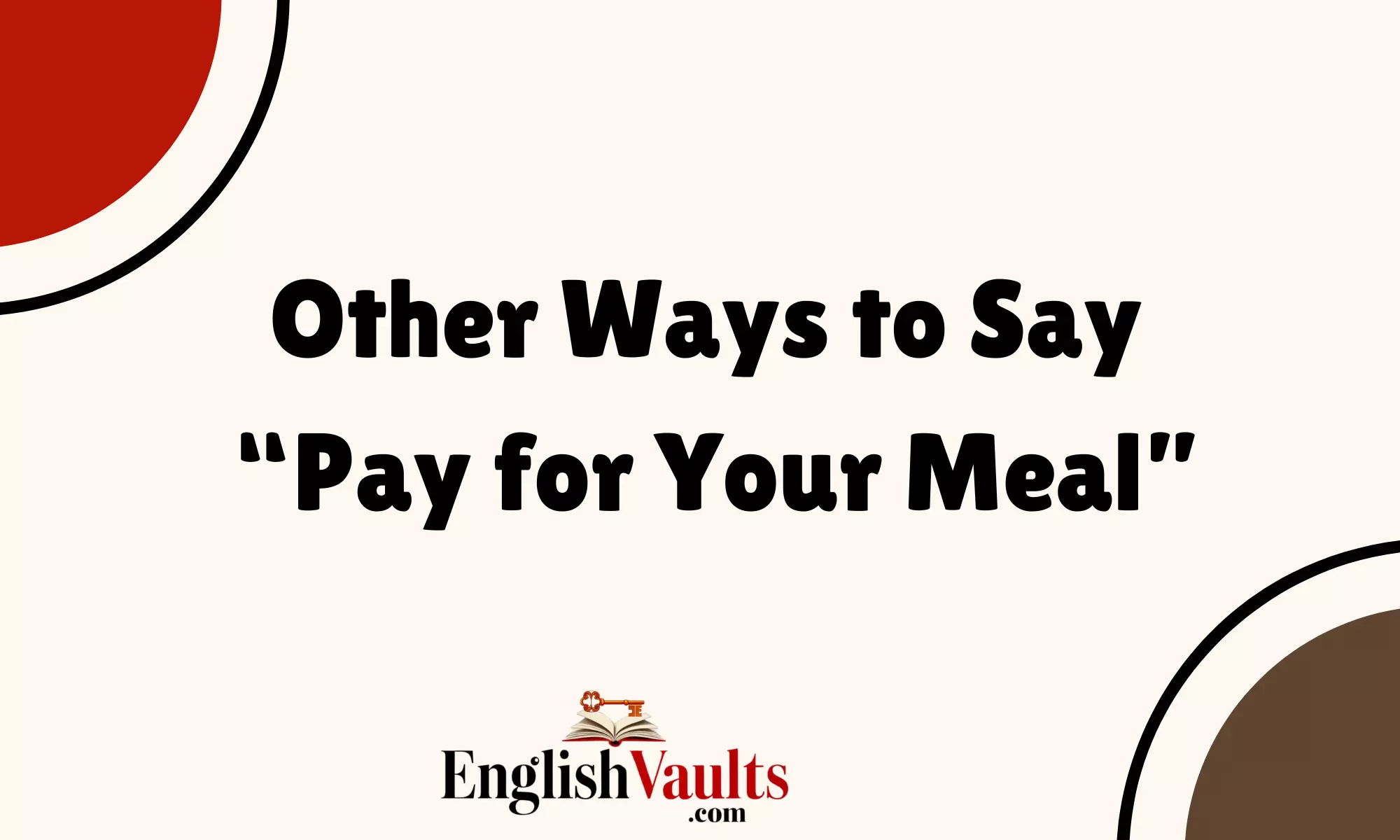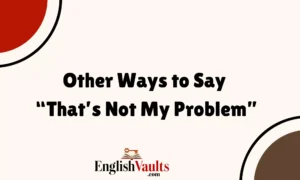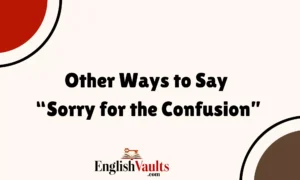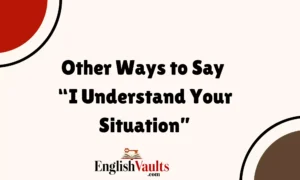When planning a gathering or meeting over food, it can sometimes feel a little awkward to tell someone that they’ll need to cover the cost of their meal. Whether you’re hosting a casual get-together with friends or organizing a business lunch, finding the right words to let people know they should pay for themselves can be tricky. The key is to be polite yet clear, avoiding misunderstandings while maintaining a respectful tone. Below are 27 different ways to communicate this, with real-world scenarios to illustrate how you can use each phrase effectively.
List of 27 Other Ways to Say “Pay for Your Meal”
- “Everyone Will Be Handling Their Bill”
- “It’s Dutch Treat”
- “We’ll Each Be Paying for Our Meals”
- “Everyone Is Covering Their Tab”
- “It’s a No-Host Event”
- “Let’s Go Dutch”
- “Each Person Will Handle Their Charges”
- “Everyone Is Responsible for Their Costs”
- “We’ll All Pay Separately”
- “Meals Are Not Included”
- “Each Guest Will Pay for Their Meal”
- “Everyone Pays for Their Food”
- “It’s Pay Your Way”
- “We’re Doing Separate Checks”
- “You’re Free to Order What You’d Like—We’ll Be Paying Individually”
- “Attendees Will Pay Their Way”
- “Everyone Will Settle Their Bill”
- “It’s Self-Pay”
- “We’ll All Be Paying for Our Meals”
- “Guests Will Be Responsible for Their Expenses”
- “You’ll Need to Cover Your Tab”
- “Everyone’s On Their Own for the Meal”
- “Each Person Covers Their Costs”
- “Everyone Will Be Responsible for Their Meals”
- “You’re Welcome to Order Anything—You’ll Need to Pay for It Yourself”
- “Please Keep in Mind That Everyone Pays for Their Meal”
- “Don’t Forget: It’s Pay Your Meal”
1. “Everyone Will Be Handling Their Bill”
In a casual setting with friends or colleagues, this phrase gets the point across in a friendly way.
Scenario Example: Subject: Dinner on Friday Hi Tomi, I’m looking forward to our dinner on Friday! Just a quick note:
everyone will be handling their bill that evening, so feel free to order whatever you like. Let me know if the plan works for you. See you soon! Best, Jerry
2. “It’s Dutch Treat”
This phrase is a classic way to signal a split bill where each person pays their share.
Scenario Example: Subject: Friday Lunch Plan Hey Tomi, Just a heads up, lunch on Friday will be a Dutch treat, so make sure you’re okay with splitting the bill. Excited to catch up! Cheers, Jerry
3. “We’ll Each Be Paying for Our Meals”
If you want to be a bit more direct, this phrase leaves no room for confusion.
Scenario Example: Subject: Dinner at Bella Italia Hi Tomi, Looking forward to dinner at Bella Italia! Just so you know, we’ll each be paying for our meals. Can’t wait to try their new menu with you! Best, Jerry
4. “Everyone Is Covering Their Tab”
Using the word “tab” gives this phrase a slightly more casual, bar-friendly tone.
Scenario Example: Subject: After-work Drinks Hey Tomi, Excited for after-work drinks tomorrow! Just a heads up, everyone is covering their tab, so feel free to order what you like. Cheers, Jerry
5. “It’s a No-Host Event”
In event invitations, especially formal ones, the term “no-host” is a subtle way to indicate that guests will pay their way.
Scenario Example: Subject: Invitation to the Networking Dinner Dear Tomi, You’re invited to a networking dinner this Friday! Please note, that it’s a no-host event, so each attendee will be responsible for their meal. Looking forward to seeing you there! Best regards, Jerry
6. “Let’s Go Dutch”
A short and casual phrase, this one is well-known and understood by most people.
Scenario Example: Subject: Dinner Tomorrow Hey Tomi, Are you free for dinner tomorrow? I was thinking we could try that new sushi spot and go Dutch. Let me know if you’re up for it! Best, Jerry
7. “Each Person Will Handle Their Charges”
If you want a slightly more formal tone, this phrase works well in both personal and business settings.
Scenario Example: Subject: Team Lunch Hi Team, Looking forward to our team lunch next week! Just a reminder that each person will handle their charges, so feel free to order what you prefer. Best, Jerry
8. “Everyone Is Responsible for Their Costs”
This approach emphasizes personal responsibility without sounding harsh.
Scenario Example: Subject: Brunch Plan Hey Tomi, Just wanted to remind you about brunch this Sunday. Everyone is responsible for their costs, so order whatever you like! Cheers, Jerry
9. “We’ll All Pay Separately”
A simple and direct way to ensure the message is clear.
Scenario Example: Subject: Lunch on Wednesday Hi Tomi, I’m looking forward to our lunch this Wednesday. We’ll all pay separately, so feel free to enjoy whatever catches your eye on the menu! Best, Jerry
10. “Meals Are Not Included”
In formal invitations, stating that meals are not included informs attendees that they’ll need to pay their share.
Scenario Example: Subject: Conference Dinner Dear Tomi, We are pleased to invite you to the conference dinner next Thursday. Please note that meals are not included, so each guest will cover their costs. Best regards, Jerry
11. “Each Guest Will Pay for Their Meal”
This is a polite yet straightforward way to set expectations in a group setting.
Scenario Example: Subject: Group Dinner on Saturday Hi Tomi, For our group dinner on Saturday, each guest will pay for their meal. Looking forward to seeing everyone there! Best, Jerry
12. “Everyone Pays for Their Food”
Short and to the point, this option is great for casual get-togethers.
Scenario Example: Subject: BBQ at the Park Hey Tomi, We’re organizing a BBQ at the park next weekend. Everyone pays for their food, so bring whatever you’d like to grill! Cheers, Jerry
13. “It’s Pay Your Way”
A more colloquial phrase, this works well for casual or semi-formal settings.
Scenario Example: Subject: Sunday Brunch Hi Tomi, How does brunch on Sunday sound? It’s paid your way, so feel free to join us! Best, Jerry
14. “We’re Doing Separate Checks”
This is a common way to ensure everyone knows they’re paying individually without any awkwardness.
Scenario Example: Subject: Dinner Plan Hi Tomi, Let’s meet for dinner tomorrow night. Just so you know, we’re doing separate checks. Looking forward to catching up! Best, Jerry
15. “You’re Free to Order What You’d Like—We’ll Be Paying Individually”
This phrase offers flexibility for people to order what they wish while clearly stating they’ll be paying separately.
Scenario Example: Subject: Catch-up Over Lunch Hey Tomi, Let’s catch up over lunch tomorrow! You’re free to order what you’d like—we’ll be paying individually, so no pressure on what you choose. Best, Jerry
16. “Attendees Will Pay Their Way”
This phrase is especially useful for formal event invitations where you need to clarify payment.
Scenario Example: Subject: Invitation to the Luncheon Dear Tomi, We’d love for you to attend our luncheon next week. Please note that attendees will pay their way. Hope to see you there! Best regards, Jerry
17. “Everyone Will Settle Their Bill”
A polite, business-friendly way to express that everyone will pay for themselves.
Scenario Example: Subject: Business Lunch Hi Tomi, I’ve booked a business lunch with a few colleagues for next Monday. Everyone will settle their bill, so feel free to choose what suits you best! Best, Jerry
18. “It’s Self-Pay”
This is a short way to let people know that they’ll be paying for themselves.
Scenario Example: Subject: Dinner at Joe’s Diner Hey Tomi, How about dinner at Joe’s Diner this Friday? It’s self-pay, so bring your appetite, and let’s enjoy! Cheers, Jerry
19. “We’ll All Be Paying for Our Meals”
Straightforward and clear, this phrase ensures everyone is on the same page.
Scenario Example: Subject: Sunday Brunch Hi Tomi, Looking forward to brunch on Sunday! We’ll all be paying for our meals, so order whatever you’re craving! Best, Jerry
20. “Guests Will Be Responsible for Their Expenses”
This phrase is useful in both personal and business contexts, particularly for events.
Scenario Example: Subject: Annual Dinner Invitation Dear Tomi, We’re excited to invite you to our annual dinner next month. Please note, that guests will be responsible for their expenses during the event. Best regards, Jerry
21. “You’ll Need to Cover Your Tab”
A casual and direct way to communicate individual payment.
Scenario Example: Subject: Lunch Meetup Hey Tomi, I’d love to grab lunch with you next week. Just so you know, you’ll need to cover your tab, so pick whatever looks good! Best, Jerry
22. “Everyone’s On Their Own for the Meal”
This phrase keeps it casual while emphasizing individual payment.
Scenario Example: Subject: Dinner at the Bistro Hi Tomi, I’m planning a dinner at the bistro this weekend. Everyone’s on their own for the meal, so feel free to order what you like! Best, Jerry
23. “Each Person Covers Their Costs”
A more formal way to make
the same point, this phrase conveys responsibility while maintaining professionalism.
Scenario Example: Subject: Office Lunch Outing Hi Tomi, I’ve organized a lunch outing for the team this Thursday. Just a reminder that each person covers their costs, so order what you’d like! Best, Jerry
24. “Everyone Will Be Responsible for Their Meals”
This phrase is straightforward and makes it clear that guests need to plan for their expenses.
Scenario Example: Subject: Dinner Plans for Friday Hey Tomi, I’m excited about our dinner plans for Friday! Just a quick note that everyone will be responsible for their meals. Looking forward to it! Best, Jerry
25. “You’re Welcome to Order Anything—You’ll Need to Pay for It Yourself”
This phrase provides a warm invitation while clearly stating the payment arrangement.
Scenario Example: Subject: Lunch Plans Hi Tomi, Let’s grab lunch this week! You’re welcome to order anything—you’ll need to pay for it yourself, though. Hope that’s okay! Best, Jerry
26. “Please Keep in Mind That Everyone Pays for Their Meal”
This approach balances friendliness with clarity, making it appropriate for most settings.
Scenario Example: Subject: Group Dinner on Saturday Night Hi Tomi, Just confirming our group dinner this Saturday night. Please keep in mind that everyone pays for their meal Excited to catch up with everyone! Best, Jerry
27. “Don’t Forget: It’s Pay Your Meal”
This casual reminder can be used just before the event to reinforce the payment method.
Scenario Example: Subject: Reminder for Dinner Tonight Hey Tomi, Just a quick reminder about dinner tonight. Don’t forget: it’s pay for your meal, so come hungry! Cheers, Jerry.
conclusion,
In conclusion, knowing how to communicate that guests need to pay for their meals is an important skill, especially in social and professional settings. The phrases provided in this article range from casual to formal, giving you a variety of options to choose from based on your audience and context. By choosing the right wording, you can ensure that everyone is informed without causing any awkwardness or discomfort. Being upfront about costs not only helps avoid confusion but also creates a transparent atmosphere where everyone can enjoy their meal without financial surprises. So, the next time you’re organizing an outing, keep these alternatives in mind to make your communication smooth and effective!

Ethan Richards, an accomplished English educator in higher education, brings over a decade of expertise in instructing and assessing proficiency tests such as TOEFL, IELTS, BULATS, FCE, CAE, and PTEG. Through EnglishVaults.com, he crafts insightful English lessons tailored for learners seeking mastery in the language.










